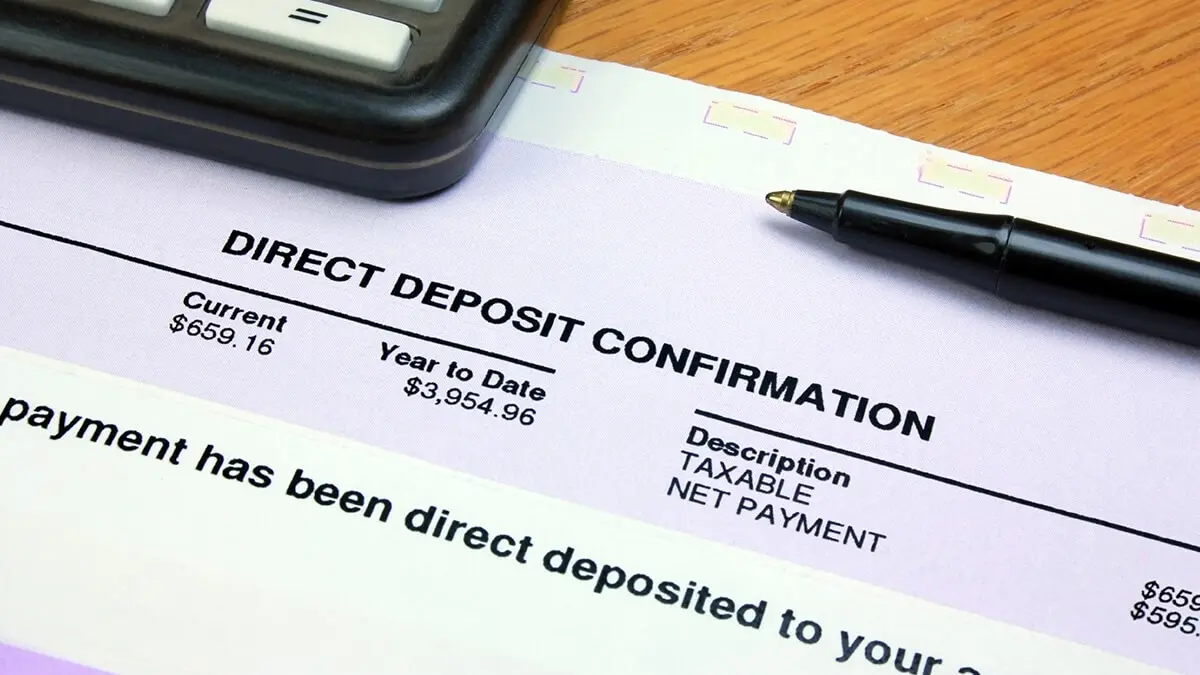Employers can choose from a few types of payment methods to offer employees. One popular option is direct deposit. You can also pay employees with handwritten or printed paychecks. Before deciding what is the best option for your business, you should weigh the pros and cons of each.
Learn more about direct deposit vs. check and what their advantages and disadvantages are below.
Paper checks vs. direct deposit
Direct deposit is considered an electronic funds transfer (EFT) that deposits an employee’s wages directly into their bank account.
Employers distribute paper checks to their employees. You can either hand write checks or print them on check stock paper. The checks typically list the employee’s name, the amount owed to the employee, company information, and an authorized signature. The employees are responsible for cashing their own checks.
| Direct Deposit Pros | Direct Deposit Cons | Paper Check Pros | Paper Check Cons |
|---|---|---|---|
| Time savings | Fees | Privacy and control | Easy to lose |
| Safe to use | Time | Saving money | Time-consuming and costly |
Pros and cons of paper checks
Some employees may prefer paper checks over setting up direct deposit. There are pros and cons for both you and your employees.
Pros of paper checks
Check out some of the reasons you may choose to pay employees with paper checks.
1. Privacy and control
Paper checks allow employees to have more privacy and control over their paychecks. Paper checks allow employees to keep their banking information private from employers. Some employees do not feel comfortable sharing this type of information and will not want to share it with you. Keeping bank information private allows employees to keep control over who has access to their bank account and information.
Paper checks allow employees to have complete control over their wages. Once an employee receives a check, they can determine when or where they cash it. If they prefer to wait to cash it, they can. Employees can choose to deposit their check into any bank account they would like or cash it instead.
2. Saving money
Opening a basic bank account can cost around $25 to $100, depending on the bank and account type. Having the option to cash a paper check will prevent employees from paying the fees associated with opening a bank account.
Cons of paper checks
Consider the cons below before deciding to issue paper checks.
1. Easy to lose
Paper checks can get lost, misplaced, stolen, or damaged. If an employee loses a check, employees and employers will have to spend additional time replacing the check. Depending on how you handle the situation, replacing a lost check could result in the employee paying an additional fee.
Lost checks can also be dangerous for your business. The paycheck lists your business’s name and address, as well as your signature. Even worse, your bank’s account number, routing number, and name are listed on the paychecks. The information on a check can give someone a way to access your business bank account and information.
2. Time-consuming and costly
Employees who receive paper checks may not be able to cash them on holidays and weekends. Depending on when the employee receives a paper check, they may have to wait until the next banking day to cash their check. Most banks close early on the weekends and are closed on federal holidays.
The process of cashing paper checks is not instant. Employees will spend extra time depositing or cashing their paper checks versus having their wages electronically deposited. This can be time-consuming for employees who have to drive to a bank and wait in line to receive their pay.
Issuing paper checks means more time and money spent ordering supplies. You need certain supplies, such as check stock paper, to print the checks. If you are doing your own payroll check printing, you may also need to purchase a special type of ink and laser printer. You can purchase check stock paper from a local office supply store or your bank.
Pros and cons of direct deposit
Weigh the pros and cons before paying employees through direct deposit.
Pros of direct deposit
Check out some of the reasons you may consider offering direct deposit to your employees.
1. Time savings
Direct deposit is simple for employers to use and easy for employees to access. Employees can choose what accounts they would like the money deposited into and have access to the funds as soon as they are deposited. Employees will also save time by not having to make multiple trips to the bank.
Paying employees anytime and anywhere with direct deposit saves time for both the employee and employer. Employees receive direct deposit payments regardless of whether they are at work or not.
2. Safe to use
Unlike paper checks, direct deposit can’t be misplaced, stolen, or lost. As a business owner, you do not have to worry about a lost or stolen paycheck getting into the wrong hands. Direct deposit is a safe and confidential option for employees and employers.
Cons of direct deposit
Before offering direct deposit to employees, you may want to consider the following.
1. Fees
Although it would cut down on the cost of supplies, implementing direct deposit can result in set up fees for the employer. Your bank may also charge you a transaction fee when you transfer money into an employee’s account. Before moving forward with direct deposit, determine if your business can handle the additional expenses.
Your employees may have additional fees of their own. Employees must own a bank account to receive payments. If an employee does not have a bank account, then the employee needs to open an account, which can cost them money in fees.
2. Time sensitivity
If you do not collect time and attendance records and run payroll by a certain day, direct deposit won’t be available on payday. Employees do not want to receive late paychecks. If payroll is not run in time for direct deposit, the employer will most likely have to expedite the payroll, which can result in more fees for the employer.
Do you have some employees who want to be paid via direct deposit and some who want paper checks? No problem! Patriot’s online payroll software offers free direct deposit and the ability to print checks. Try it for free today!
This article has been updated from its original publication date of November 19, 2018.
This is not intended as legal advice; for more information, please click here.



